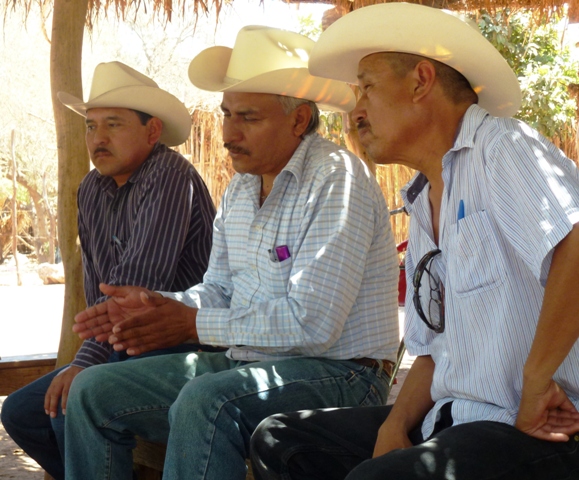By Flor Rebeca Amarillas Sánchez, Dania Noheli Meneses
Velázquez,
and Marco Antonio Rodríguez Valerio*
Now more than ever there is concern among the Yaqui, a tribe never defeated by the Spanish during their conquest of Mexico, nor by anyone else since then, that their interests are being ignored.
Today, Mario Luna, Yaqui Tribal Defense Secretary states, “We feel that they don’t take us into account and they treat us like we do not exist because of our different beliefs. That's why we would like them to listen to us.”
Luna was speaking to a group of high school students from a number of COBACH campuses in southern Sonora. He spoke Spanish in his role as interpreter for Gov. Juan Piña and the other members of the tribal council who conduct their meetings in their native language.
Because of the tribe’s views and because they feel it is important to encourage the students and respond to the concerns of both students and teachers, they decided to offer their time and space, and even allow photos, which they usually limit, Luna explained.
Responding to a question by student Gladys Cázares, Yaqui engineers present at the meeting said the improper use and application of agricultural chemicals could cause a number of health problems, including skin cancer and leukemia.
Yaqui engineer Juan Domingo Molina complained that “crop dusters fly over the community and there doesn’t seem to be any regulation of this.”
He said that in order to apply these chemicals, the wind should be less than 5 miles per hour, but that even with stronger winds they are applied.
“There have been problems with our people,” he continued. Farm workers who spray with packs on their backs “sometimes do not read the labels, do not seal the pumps well, do not wear a mask, and get chemicals directly on their skin. These are serious problems.”
Yaqui engineer Thomas Rojo pointed out the danger of water pollution: “both with rain and irrigation, pollutants “percolate” into the ground. We know that pollutants are then extracted from groundwater via two wells,” he said. Both in utero and passed through breast milk, these chemicals “may affect children. For this reason, a study needs to be done,” he says.
“Do you know of any organic pesticide?” student Amaranta Márquez asked.
The best method according to experts is integrated pest management and not using chemical agents, responded Molina. To this end, he said “they are producing insect larvae that are parasites of the Saltmarsh caterpillar (Estigmene acrea).”
Rojo said that the cultivation of genetically modified plants is “very dangerous” because “genetic modification results in a plant that is resistant to certain chemicals used for pest control that would otherwise adversely affect the plant.”
Genetically modified crops can cause allergic reactions and can result in the accidental modification of other species. Examples of genetically modified crops are short yellow corn and, most recently, watermelons, adds Rojo.
* Students, COBACH Preparatory School, Obregón No. 3
 Mario Luna (left), Tomás Rojo (center) and Juan Domingo Molina: Yaqui officials and engineers express concern over the use of agrochemicals and transgenics. (Photo: Karim Oswaldo Duarte Nafarrate, COBACH No. 3)
Mario Luna (left), Tomás Rojo (center) and Juan Domingo Molina: Yaqui officials and engineers express concern over the use of agrochemicals and transgenics. (Photo: Karim Oswaldo Duarte Nafarrate, COBACH No. 3) Mario Luna (left), Tomás Rojo (center) and Juan Domingo Molina: Yaqui officials and engineers express concern over the use of agrochemicals and transgenics. (Photo: Karim Oswaldo Duarte Nafarrate, COBACH No. 3)
Mario Luna (left), Tomás Rojo (center) and Juan Domingo Molina: Yaqui officials and engineers express concern over the use of agrochemicals and transgenics. (Photo: Karim Oswaldo Duarte Nafarrate, COBACH No. 3)